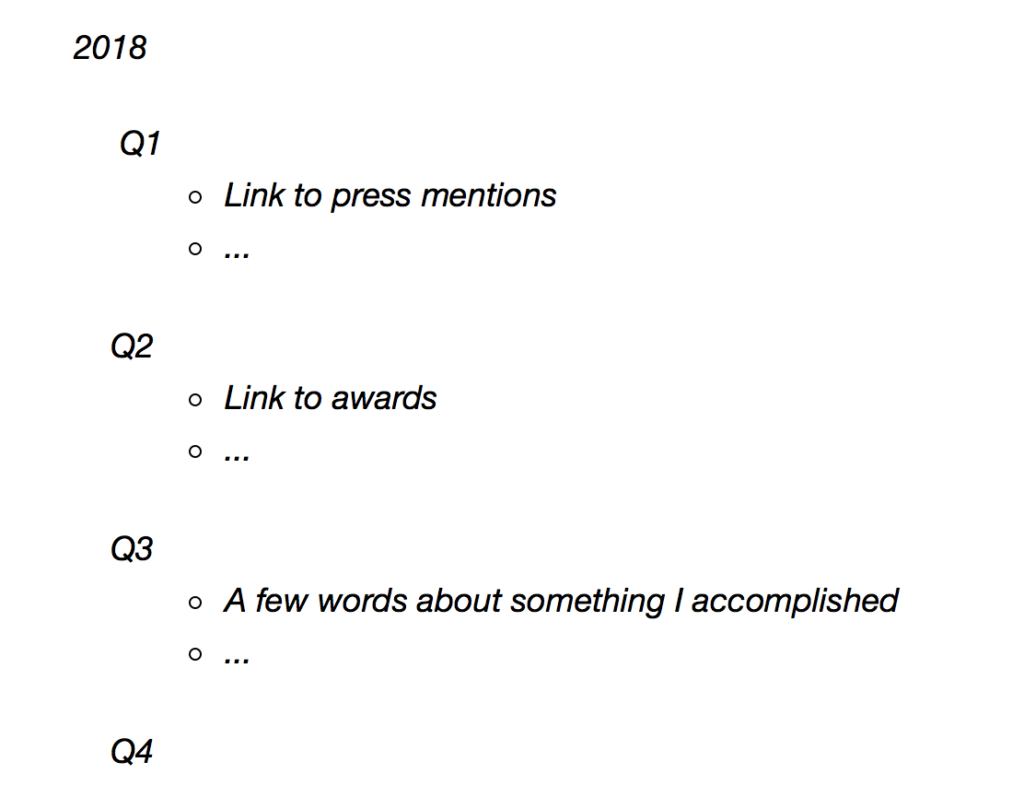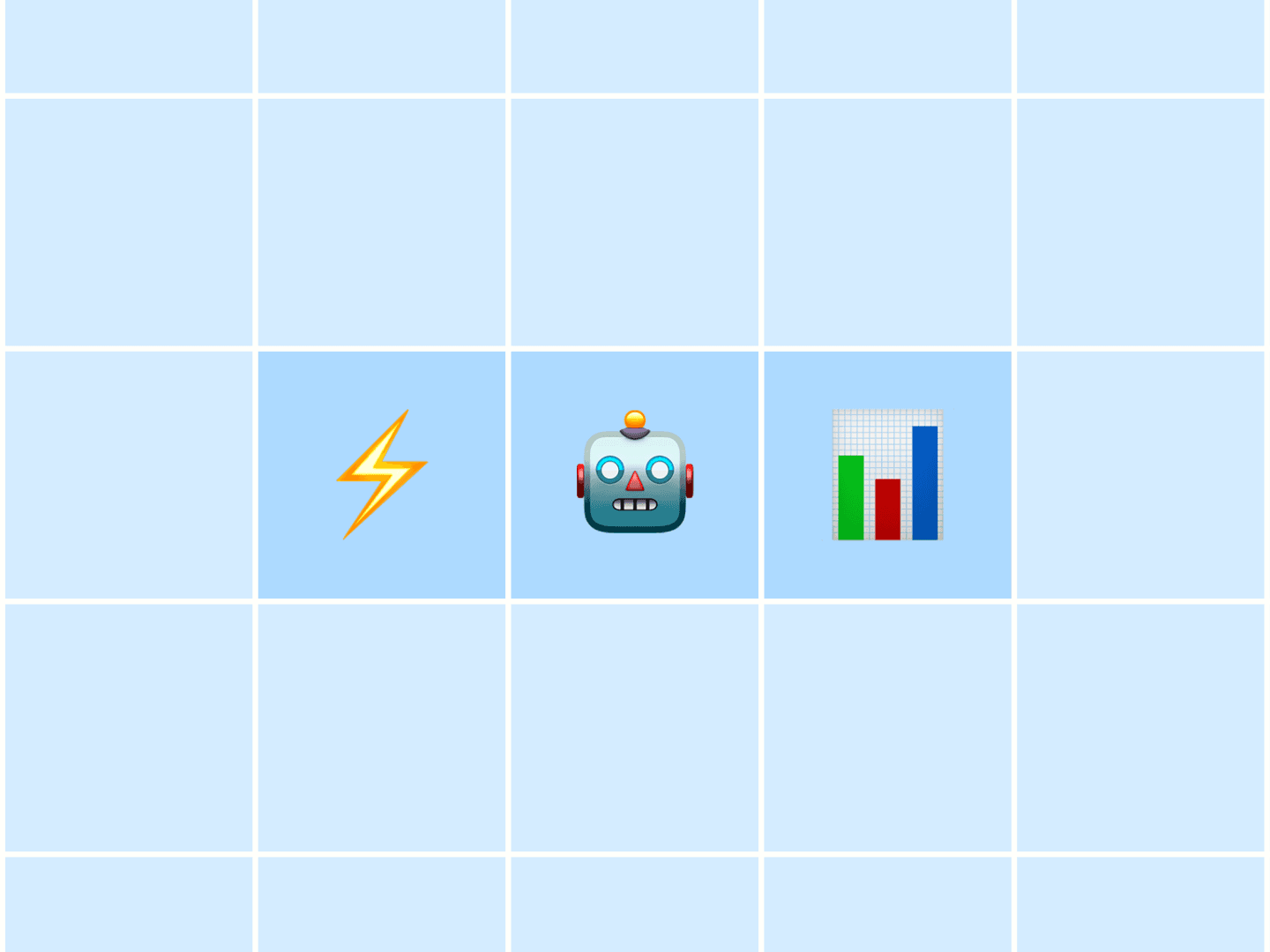I am the kind of person who really thrives on lists.
On the blog, we’ve written about lists as both a key element of a daily success routine as well as a vehicle for accounting for your productivity each day. Personally, I make lists of tasks every day in Todoist, and I also keep an ongoing list of my goals.
There’s one group of lists I make in particular that I classify as “career lists.” There are five specific lists I’ve been keeping for a few years now, and they are all related to my career in one way or another.
I keep all of these in Evernote in a folder called “Career” and reference them around the time we’re doing performance reviews or when I’m pitching myself for a promotion.
Over time, I’ve been really grateful to have these lists on hand. If you’re a list-maker too, some of these might be useful to try!
Here’s a look at what’s in each of my five career lists:
1. Career accomplishments
Possibly the most important list that I think everyone should make – and the easiest list to make! – is a list of career accomplishments.
I have this in one list with section titles for the year as well as the quarter. Quarterly is how I like to break it up, but you can create your list however you’d like. If you do performance reviews twice a year, for example, then it might make more sense to make this list into 6-month blocks.
This list doesn’t need to be too detailed. Mine is just bullet points with a few words that I’ll understand when it comes time to reference them in performance reviews.
My list might look something like this:

2. Performance review notes
This is a newer note for me, but it’s been really useful already. I’ve started keeping all of my performance review notes in one document.
At Buffer we’ve moved from no performance reviews at all to regular reviews. Generally, I get performance reviews via email and then my manager and I talk about it in a one-on-one session. Rather than leaving the performance review notes in my email, I’ve just moved them over to Evernote so that next time we do performance reviews I can quickly check in on the notes from my last review and see how I’m progressing.
We also do something called 360-degree reviews at Buffer, where I review myself and three of the colleagues that I work most closely, and those colleagues also review me. It’s all done anonymously through CultureAmp. We only do 360-degree reviews once a year and I keep those in this note as well, since they are a useful kind of performance review.
3. People whose career I admire
This is a note I started back at university. There are a lot of incredible people whose careers and journeys I greatly admire. I started keeping a list of those people to be able to compare my progress to theirs. I’ll ask myself what it is about this person that I admire, and then brainstorm some of the ways that I can incorporate more of what I admire about them into my own career.
For example, someone I am a huge fan of (and whom I also had the pleasure of interviewing on the Buffer podcast) is Ryan Holiday. He keeps a blog and newsletter, and he’s been vocal about how important both of those things can be for personal branding and career progress, so I have my own blog and newsletter also.
4. Companies I admire
Similar to the people I admire, I also keep tabs on companies I admire.
There are so many reasons to do this. If ever I were to be job hunting, it’s great to have this list handy. I’ve used it most recently to send to a friend who was looking for companies with great values.
Sometimes I might even go one step further and use the “companies I admire” list to add to the “people I admire” list. For example, maybe I’ll look at a company I admire to find their Director of Communications or a Public Relations Manager that I can follow on Twitter.
5. Job descriptions for other companies
This last one is a little unusual but has been really fun to keep: I keep a list of job descriptions that are either similar to my current role, or a level or two above it.
The reason this has been so useful to me is that Buffer is a smallish (90 person) company, and I am the only person who has ever been in my role. If I want to know what it takes to get to the next level in my profession, one of the best places to look is other companies’ job descriptions.
—
That’s it! I don’t check these notes all the time and it’s a very low commitment on my end to keep them updated, but I’m always so grateful that I do.
Now, I’d love to hear from you! Do you keep any lists or notes related to your career? Are there any lists you think I’m missing? Send me a tweet or leave a comment below.
Editor’s Note: This post originally appeared on Hailley’s blog and is reprinted here with permission. If you liked this post, she has a great newsletter also!
Try Buffer for free
190,000+ creators, small businesses, and marketers use Buffer to grow their audiences every month.




